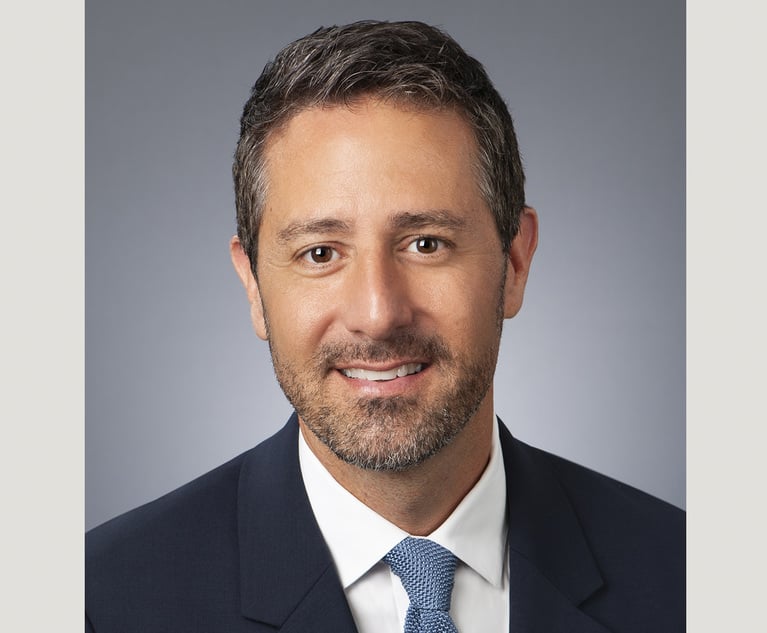Protecting Clients From Inadvertent Disclosure
Most attorneys are aware of their obligation to protect the attorney-client privilege, including the goal of avoiding of possible waiver resulting from the disclosure of privileged documents to third parties.
January 07, 2020 at 01:20 PM
6 minute read
 Shari Klevens, left, and Alanna Clair, Dentons (Courtesy Photo)
Shari Klevens, left, and Alanna Clair, Dentons (Courtesy Photo)Most attorneys are aware of their obligation to protect the attorney-client privilege, including the goal of avoiding of possible waiver resulting from the disclosure of privileged documents to third parties. For that reason, one of the biggest fears for many attorneys is the potential inadvertent disclosure of a privileged communication that jeopardizes the application of the privilege to the client's detriment.
Such disclosures typically (but not always) occur in connection with the discovery process in litigation and are one of the primary reasons that discovery can be so time-consuming and expensive. Before producing documents, attorneys often review each page for applicable privileges, prepare privilege logs, and then potentially incur additional time resolving any disputes regarding the application of the asserted privileges.
However, despite attorneys' best efforts (and even when using the most advanced e-discovery software), mistakes happen and privileged documents are produced. Indeed, courts have recognized "the practical problem of inadvertent disclosure in the context of today's reality that document production may involve massive numbers of documents," see Ardon v. City of Los Angeles, 62 Cal. 4th 1176, 1188, 366 P.3d 996, 1002 (2016). As a result of the need to review so many documents, it is not uncommon for attorneys to accidentally produce a privileged communication buried in a large document production.
Besides simply attempting to avoid the production of privileged materials in the first place, attorneys can take steps to limit the potential adverse impact of an inadvertent disclosure when it occurs. Below are some tips for limiting risks when producing documents to an opposing party or to any party outside the attorney-client relationship.
Consider Using a Clawback Agreement
While the protections provided by courts for inadvertently disclosed documents can vary by jurisdiction, many attorneys consider using written "clawback" agreements to provide added protection. In federal courts, parties can enter into agreements that include a request for a court order pursuant to Federal Rule of Evidence 502, which was the subject of 2008 amendments intended to address the growing concern with inadvertent disclosure as discovery demands and electronic discovery increased.
Fed. R. Evid. 502(d) provides that: "A federal court may order that the privilege or protection is not waived by disclosure connected with the litigation pending before the court—in which event the disclosure is also not a waiver in any other federal or state proceeding." Fed. R. Civ. P. 26(b)(5)(B) similarly provides protection for inadvertent disclosures, but may not carry the same weight as a court order confirming the parties' arrangement.
In amending Fed. R. Evid. 502(d), the advisory committee provided insight on why formal agreements are now a more common practice: "The amendment responds to the widespread complaint that litigation costs necessary to protect against the waiver of the attorney-client privilege or work product have become prohibitive due to the concern that any disclosure (however innocent or minimal) will operate as a subject matter waiver of all protected communications or information." Because the cost of reviewing thousands of pages is significant, a 502 agreement and court order can be the most cost-effective route to protect the attorney-client privilege.
Address Prior to Producing Documents
Because this is a relatively known risk, many litigants will seek a formal agreement and court order before the initial production of documents. It may be too late to reach an agreement after documents have been produced and a mistake has been discovered. Many judges are familiar with clawback agreements and will facilitate the timely entering of such an order upon the parties' request.
Once an inadvertent disclosure is uncovered, an attorney's request for a clawback agreement could appear self-serving. The perception may be that the attorney is making concessions in an agreement not because it is in the client's best interest, but because the attorney must undo a mistake and limit their own exposure.
In addition to protecting against waiver, the agreement and order can also identify the parties' obligations and the steps to take in the event of an inadvertent disclosure. California has a specific statute (Section 2031.285) specifying a procedure for addressing privilege or work product claims with respect to electronically stored information produced in discovery.
Evaluating Inadvertent Disclosure Claims
California courts hold that, where there is an inadvertent disclosure of a privileged document, there is typically no voluntary relinquishment of a known right necessary for a finding that the privilege has been waived. See, e.g., State Compensation Insurance Fund v. WPS, 70 Cal. App. 4th 644, 653, 82 Cal. Rptr. 2d 799, 805 (1999). California courts have specifically repudiated the "'gotcha' theory of waiver, in which an underling's slip-up in a document production becomes the equivalent of the actual consent" necessary for a finding that the privilege is waived, see Ardon, 62 Cal. 4th at 1187 (citing State Comp. Ins. Fund, 70 Cal. App. 4th at 654).
Thus, under California law as well as federal law, whether the inadvertent disclosure of privileged materials will constitute a subject matter waiver depends on whether the disclosure was truly inadvertent. Fed. R. Evid. 502(b) specifically considers whether the privilege holder took reasonable steps to prevent disclosure, and whether the holder took reasonable steps to rectify the inadvertent production. A variety of factors will be relevant to whether the litigant took "reasonable steps" to prevent disclosure, including the scope of discovery, the extent of the disclosure, the amount of time it took to remedy the errors, and the overriding issue of fairness.
A party faced with preparing thousands of documents for production thus may be tempted to forego an initial privilege review, instead hoping to rely on the right to claw back any privileged materials. That nonetheless remains a risky approach as, even with an agreement in place, a court could find that the party failed to take the "reasonable steps" necessary to protect the privilege prior to disclosure.
In many cases, there is no avoiding the fact that discovery can be a particularly arduous process that involves collecting and carefully reviewing documents for production. However, with a clawback agreement in place and the other protections afforded under applicable law, attorneys can limit any adverse impact of an inadvertent disclosure.
Shari L. Klevens is a partner at Dentons US and serves on the firm's US Board of Directors. She represents and advises lawyers and insurers on complex claims, is co-chair of Dentons' global insurance sector team, and is co-author of "California Legal Malpractice Law" (2014). Alanna Clair is a partner at Dentons US and focuses on professional liability defense. Shari and Alanna are co-authors of "The Lawyer's Handbook: Ethics Compliance and Claim Avoidance."
This content has been archived. It is available through our partners, LexisNexis® and Bloomberg Law.
To view this content, please continue to their sites.
Not a Lexis Subscriber?
Subscribe Now
Not a Bloomberg Law Subscriber?
Subscribe Now
NOT FOR REPRINT
© 2025 ALM Global, LLC, All Rights Reserved. Request academic re-use from www.copyright.com. All other uses, submit a request to [email protected]. For more information visit Asset & Logo Licensing.
You Might Like
View All
Buchalter Hires Longtime Sheppard Mullin Real Estate Partner as Practice Chair

Freshfields Hires Ex-SEC Corporate Finance Director in Silicon Valley

Holland & Knight Hires Former Davis Wright Tremaine Managing Partner in Seattle
3 minute read
Paul Hastings Hires Music Industry Practice Chair From Willkie in Los Angeles
Law Firms Mentioned
Trending Stories
- 1We the People?
- 2New York-Based Skadden Team Joins White & Case Group in Mexico City for Citigroup Demerger
- 3No Two Wildfires Alike: Lawyers Take Different Legal Strategies in California
- 4Poop-Themed Dog Toy OK as Parody, but Still Tarnished Jack Daniel’s Brand, Court Says
- 5Meet the New President of NY's Association of Trial Court Jurists
Who Got The Work
J. Brugh Lower of Gibbons has entered an appearance for industrial equipment supplier Devco Corporation in a pending trademark infringement lawsuit. The suit, accusing the defendant of selling knock-off Graco products, was filed Dec. 18 in New Jersey District Court by Rivkin Radler on behalf of Graco Inc. and Graco Minnesota. The case, assigned to U.S. District Judge Zahid N. Quraishi, is 3:24-cv-11294, Graco Inc. et al v. Devco Corporation.
Who Got The Work
Rebecca Maller-Stein and Kent A. Yalowitz of Arnold & Porter Kaye Scholer have entered their appearances for Hanaco Venture Capital and its executives, Lior Prosor and David Frankel, in a pending securities lawsuit. The action, filed on Dec. 24 in New York Southern District Court by Zell, Aron & Co. on behalf of Goldeneye Advisors, accuses the defendants of negligently and fraudulently managing the plaintiff's $1 million investment. The case, assigned to U.S. District Judge Vernon S. Broderick, is 1:24-cv-09918, Goldeneye Advisors, LLC v. Hanaco Venture Capital, Ltd. et al.
Who Got The Work
Attorneys from A&O Shearman has stepped in as defense counsel for Toronto-Dominion Bank and other defendants in a pending securities class action. The suit, filed Dec. 11 in New York Southern District Court by Bleichmar Fonti & Auld, accuses the defendants of concealing the bank's 'pervasive' deficiencies in regards to its compliance with the Bank Secrecy Act and the quality of its anti-money laundering controls. The case, assigned to U.S. District Judge Arun Subramanian, is 1:24-cv-09445, Gonzalez v. The Toronto-Dominion Bank et al.
Who Got The Work
Crown Castle International, a Pennsylvania company providing shared communications infrastructure, has turned to Luke D. Wolf of Gordon Rees Scully Mansukhani to fend off a pending breach-of-contract lawsuit. The court action, filed Nov. 25 in Michigan Eastern District Court by Hooper Hathaway PC on behalf of The Town Residences LLC, accuses Crown Castle of failing to transfer approximately $30,000 in utility payments from T-Mobile in breach of a roof-top lease and assignment agreement. The case, assigned to U.S. District Judge Susan K. Declercq, is 2:24-cv-13131, The Town Residences LLC v. T-Mobile US, Inc. et al.
Who Got The Work
Wilfred P. Coronato and Daniel M. Schwartz of McCarter & English have stepped in as defense counsel to Electrolux Home Products Inc. in a pending product liability lawsuit. The court action, filed Nov. 26 in New York Eastern District Court by Poulos Lopiccolo PC and Nagel Rice LLP on behalf of David Stern, alleges that the defendant's refrigerators’ drawers and shelving repeatedly break and fall apart within months after purchase. The case, assigned to U.S. District Judge Joan M. Azrack, is 2:24-cv-08204, Stern v. Electrolux Home Products, Inc.
Featured Firms
Law Offices of Gary Martin Hays & Associates, P.C.
(470) 294-1674
Law Offices of Mark E. Salomone
(857) 444-6468
Smith & Hassler
(713) 739-1250






